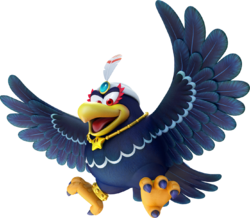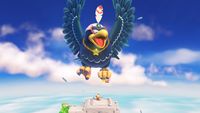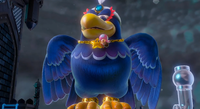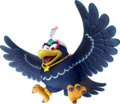Wingo
| Wingo | |
|---|---|

| |
| Species | Bird |
| First appearance | Captain Toad: Treasure Tracker (2014) |
| Latest appearance | Captain Toad: Treasure Tracker (Nintendo Switch / 3DS) (2018) |
Wingo is the main antagonist in Captain Toad: Treasure Tracker and its Nintendo Switch and Nintendo 3DS ports. He is a gigantic bird with a penchant for stealing treasure from others. He is first seen stealing a Power Star from Captain Toad and Toadette, and flies away with Toadette grabbing the star, thus capturing her.
History
Wingo first appears in the opening level of Episode 1, where he ambushes the two Toads as they approach a Power Star, and after which claims it for himself. Captain Toad is stunned at the attack, while Toadette grabs on to the star to attempt to reclaim it. Wingo, however, makes off with the star, kidnapping Toadette in the process.
Wingo does not reappear until the end of Blizzard on the Star Express (save for a few cameos in interstitial stages). Here he abducts Captain Toad and drags him off to Wingo's Watchtower, dropping him in front of the tower at the beginning of the stage. During the level, Wingo teleports around the stage and flaps his wings to create gusts of wind to blow Toad off the stage. Captain Toad can, however, stun him for a few moments by throwing turnips at him. At the end of the stage, Captain Toad fires off to the top of the tower via a Clear Pipe cannon, and battles Wingo there. During this battle, Wingo once again teleports around, attacking by blowing gusts of wind and summoning giant turnips that fall from above and can damage Captain Toad if they hit him. Wingo can be attacked by throwing the giant turnips at him, and once he is hit three times, he swallows the last turnip, falls out of the sky, and is defeated.
Wingo reappears at the start of Episode 2. He appears like before, taking a Power Star from Captain Toad and Toadette, though this time he abducts Captain Toad, leaving Toadette to journey after him. Unlike in Episode 1, Wingo does not manually bring Toadette to his tower, but waits there for her to eventually arrive. At the end of the stage, Toadette rescues Captain Toad, though Wingo then appears and abducts Toadette once again, blowing Captain Toad off the tower.
At the beginning of Episode 3, Captain Toad finds another Power Star in a cave, only for Wingo to appear and steal it once again. While he is flying away, however, he drops Toadette. Wingo appears again at the end of Scalding Scaffold Sinkhole, where he once again captures Toadette and brings her to his tower once again, though this time Captain Toad pursues him to the tower. Wingo behaves like he does during the Episode 1 battle, teleporting and blowing gusts of wind, and at the end of the stage Wingo is once again fought at the top of the tower. His attacks are the same, though this time he also summons lightning to appear when summoning the giant turnips, and he is also defeated like before. During the end credits, Wingo once again appears, though in his fat form after eating a turnip when defeated; he tries flying away, but cannot and starts falling.
Wingo also appears in the level Wingo's Double Trouble in the Special Episode of the Nintendo Switch version of the game, where a duplicate fights alongside him. The real Wingo can be told from the fake by the full Star on its necklace, and the level's bonus objective is to defeat Wingo without hitting the fake.
Although he does not appear himself, Wingo is referenced by Captain Toad in Super Mario Odyssey. When Mario finds Captain Toad in the Lost Kingdom, Captain Toad says "How'd I get here? I was dropped by a giant bird -- a different giant bird than my usual one!"
General information
Physical appearance
According to game director Shinya Hiratake, Wingo was based upon both crows, a species of bird stereotypically and incorrectly depicted as interested in shiny objects, and the giant bird Roc from One Thousand and One Nights (more popularly known as Arabian Nights).[1] He has black feathers and orange anisodactyl feet with black talons. His head also features a yellow beak and red crests on the external sides of his eyes. By default, his eyes are blue with a slight hint of purple on the upper half of the irises, but they are often seen glowing in other colors at various points, such as when he is attacking. In his official art, his eyes are red. The feathers that form the denser part of his plumage have white extremities that, on the front, form a continuous line spanning both wings and the breast. He also wears golden bracelets on his legs, a golden necklace with a Power Star around his neck, and a turban on his head, with a light-blue gem and a feather based on the Cape Feather from Super Mario World.[1]
Gallery
Artwork
Concept artwork for Captain Toad: Treasure Tracker
Screenshots
Profiles
- Website bio: "This magical bird has stuck his beak in where it doesn't belong—between Captain Toad and the Power Star!"
Names in other languages
| Language | Name | Meaning | Notes |
|---|---|---|---|
| Japanese | ウィンゴ[?] Wingo |
Pun of "wing" and possibly「ジャンゴ」(Jango, Klepto) | |
| Dutch | Wingo[?] | - | |
| German | Wingo[?] | - | |
| Italian | Wingo[?] | - | |
| Russian | Винго[?] Vingo |
Wingo | |
| Spanish | Wingo[?] | - |
References
- ^ a b (translated) Miiverse post from Hiratake (February 16, 2015): "Well, this is how Wingo was created. Adventures involve treasure, so we started off thinking that we needed a creature that gets in the way of him collecting it! We thought, 'How about a crow? They like to collect shiny things!' and from there, we fused that idea with the image of the giant bird Roc that appears in the Arabian Nights! Actually, the design of the feather on his head was inspired by an item in Super Mario World!" Retrieved July 18, 2017.






















